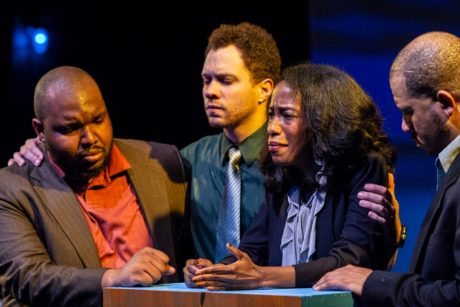“No diving. No running. Absolutely no cannonballs,” the pre-show announcement at Joe’s Movement Emporium orders. But get ready to dive deep for the world premiere of #poolparty as it unpacks the buried history of segregated swimming pools across the United States and shares a fascinating and painful local connection. Written by long-time Hyattsville, MD-based actor, Jennifer Mendenhall, #poolparty draws on the real-life experiences of the Bowlding family patriarch, Raymond, whose family was denied membership in the neighborhood pool because they were black.

These days Prince George’s County is among the most affluent African-American counties in the country. But in the early 1970s, PG County was predominantly white, working class, and segregated. When Raymond Bowlding and his family moved to a new neighborhood, they couldn’t join the local pool. He sought assistance from the NAACP to break the color barrier at Prince George’s Swimming Pool in Mount Rainier.
Court-ordered bussing for the public school system – then the 10th largest in the nation – was instituted in January 1973. I remember because I was educated in PG County schools during that period. It took another two years to integrate the PG Swimming Pool, and even then Bowlding didn’t allow his children to join the neighborhood friends there, believing it was far too dangerous to send them to a pool where they weren’t truly welcome.
Mendenhall’s play, produced by the young Ally Theatre Company, uses the Bowlding case as a starting point, fictionalizing the family, but getting at many deep-seated truths about growing up black in a community that wasn’t completely welcoming. In the play, the patriarch – re-named Ray Waters – has passed on though he hovers ghostly over his four children, observing them as they wrestle with the idea of returning to the pool that barred them as kids. They’ve been invited to a ceremony to honor their dad’s efforts to open the pool to everyone.
Jimmy Stubbs’ spare but evocative set, with its aquamarine movable blocks that reconfigure the space from pool to office to courtrooms and back again, and Hope Villanueva’s projections of shimmery blue water and the immaculate grounds of the private swim club, support the action, which toggles between past and present.
The Waters family – for the play three brothers and a sister – have moved on, putting their childhood experience behind them. Ray, Jr., the family leader, built a pool in his backyard where his daughter, Roya, became a champion swimmer. She gives voice to the current racism infecting our nation and ever present on social media channels.
A high school swimming star, she’s about to quit the team, feeling defeated by the larger political landscape, which has squelched her passion for swimming. “I can’t breathe,” she repeats, echoing the final words of the late Eric Garner, who died at the hands of police officers. Those words become her mantra and burden – a heavy load to carry along with the equally charged challenge of being an elite African-American swimmer, which remains a rarity even today.

Mendenhall’s deeply researched play uncovers reasons why black children are three times more likely to drown than their white counterparts. America’s original sin – racism – infiltrates every aspect of our current history, making swimming while black an often deadly summertime pursuit.
When pools were off limits to earlier generations of people of color, learning to swim wasn’t an option, and it didn’t get passed on to children and grandchildren. Mendenhall’s script details the consequence of this racist policy: tragedies like a 2010 incident when a Louisiana family watched six of their teenaged children drown in rough river currents because none could swim.
Roya dreams of her West African Ashanti ancestors – swimmers and divers who could glide through the deep waters holding their breath with ease, and her uncles and aunt, clad in bright clothes, move with dolphin-like dexterity behind her. But in the pool, as she practices drills, she describes seeing in her mind’s eye the bones and bodies of the many African Americans who never made it.
Roya’s Aunt Regina, conveniently a teacher, lectures on the history of swimming pools – public, private, and segregated – animatedly sharing this long-forgotten history with aplomb. Here the play gets polemical as Regina fills in the dark and ugly backstory of American pools – from poor people bathing in rivers to sex-segregated bathhouses to municipal city pools to private, members-only clubs, where discrimination was enabled by laws for private membership groups.
Director Angelisa Gillyard maneuvers her six actors across time and space and continents with minimal shifts in the simple sets and costumes (by Asia-Anansi McCallum). The play, though it clocks in at about 95 minutes, is not slight and the seamless shifts in scenes and characters demand much from the cast.
Keith Irby plays patriarch Ray with aplomb, while Eli El as Ray Jr., the responsible brother, convinces his siblings to return to the old neighborhood to honor their father. Tall, lean Lori Pitts as Roya, the swim star daughter, shares heartfelt moments as she struggles with the constant barrage of bad news on her social media feed. Her dreamt journey deep into the past, drawing strength from her ancient African root traditions, is a highlight.
Ivana Tai Alexander’s Regina, the family’s mother figure and teacher, instills pride in her family by sharing and disseminating knowledge. Jonathan Miot and Shaq Stewart play brothers Ricky and Ro, respectively, each offering foibles – one a numbers and facts guy, the other a joker – to round out the close-knit family dynamics. The brothers, too, have one of the most powerful moments in the play: they’ve been barred from the pool and when their father asks what happened, the older one can’t find the words to tell his dad, who knows exactly what was said.
#poolparty provides a broad, in-depth look at a slice of U.S. history that is mostly unknown. Mendenhall takes viewers through key court cases and other legal and municipal decisions that continue to resonate in our region’s communities today. With a strong cast and thoughtful directorial and design choices, #poolparty will change the way you think of this summertime pleasure.
As a county native – though not a swimmer – it resonated with my own early history. But even without personal connections to this local history – and, yes, Prince George’s Swimming Pool is still operating, just down the road from the theater – this is a small but important slice of our American history that must not be forgotten.
Running Time: 95 minutes, with no intermission
#poolparty plays through July 15, 2018, at Joe’s Movement Emporium – 3309 Bunker Hill Road, in Mt. Rainier, MD. For tickets, call 301-699-1819, or purchase them online.




